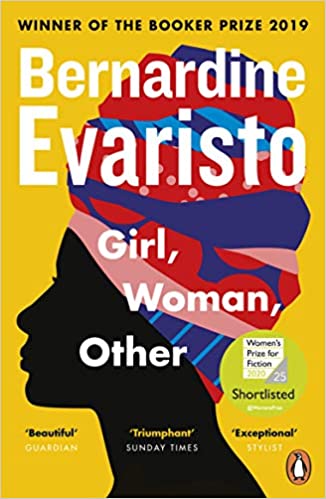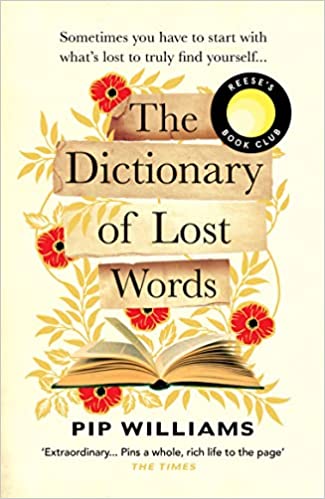where to begin with this experimental, award-winning piece of literature?
a kaleidoscopic celebration of diversity with plenty to provoke discussion
twelve characters from different generations, with wildly contrasting backgrounds and experiences, whose lives intertwine, converging on the performance of a play at the National Theatre
themes of racism, feminism, privilege and power permeate the novel

Sorry, can we just talk about the lack of capital letters and full stops? What did the group make of this style of writing? As a librarian colleague put it: we’re normally sticklers for punctuation, so it took a bit of getting used to. However, most of us agreed that once you do adjust, it helps the flow – makes it more like somebody talking, a poem, or a stream of consciousness. Some sections are clearly poetic, with thought put into how the words are laid out on the page. The title does have unusually distinctive punctuation, and there is a full stop at the end of the Epilogue – what more could we ask for?!
Amma, Yazz, Dominique; Carole, Bummi, LaTisha; Shirley, Winsome, Penelope; Megan/Morgan, Hattie, Grace: twelve characters, all born female, with their own interwoven storylines. One reader said they enjoyed the gradual process of finding out that everyone was connected, and became more invested in the interconnected characters as a result. Another said that, while the characterisation was fantastic, alongside the layering of the individuals’ stories, they felt the build-up didn’t necessary lead to a satisfying conclusion. We debated whether there could be too many characters to keep track of, but it was suggested that the distinctiveness of each helped the reader not to get too confused. There was discussion of whether we thought a screen adaptation of the novel would work, and the conclusion was that it would be ideal as a Netflix series. A film adaptation would likely have to cut too much out.
One reader posed the question: does the success of the character Amma’s play mean she has sold out on her principles, or simply that she has finally been accepted? What does somebody, who has built their identity as a reformer and campaigner, become once the campaign is over? Victories can have unforeseen personal consequences, a theme remembered from a previous George Eliot reading group book, Lissa Evans’ Old Baggage. One of our group noted that, even among characters fighting discrimination in their own ways, different generations struggled to understand each other’s battles – particularly the character Hattie, who declared that she was too old to get her head around her transgender great-grandchild’s choice of pronouns. While we may think of ourselves as being in one camp or another, in reality, as Evaristo demonstrates, our views, identities and degree of privilege are more complicated than that.
One of our group remembered having read the book in the run-up to the announcement of the Booker Prize in 2019, and expressed frustration that Bernardine Evaristo eventually had to share the prize with another author, somewhat diluting her achievement at being the first woman with black heritage to win it. We agreed that Girl, Woman, Other was nonetheless a worthy award winner.

Our book choice for July is The Dictionary of Lost Words by Pip Williams. Why not borrow a copy from the Education Centre library now – and join us on Teams, Wednesday 19th July at 1pm. For more information and a Teams invitation, email library@swft.nhs.uk or phone extension 4287.
See you soon!

One thought on “SWFT Wellbeing Reading Group book review – Girl, Woman, Other by Bernardine Evaristo”
Comments are closed.